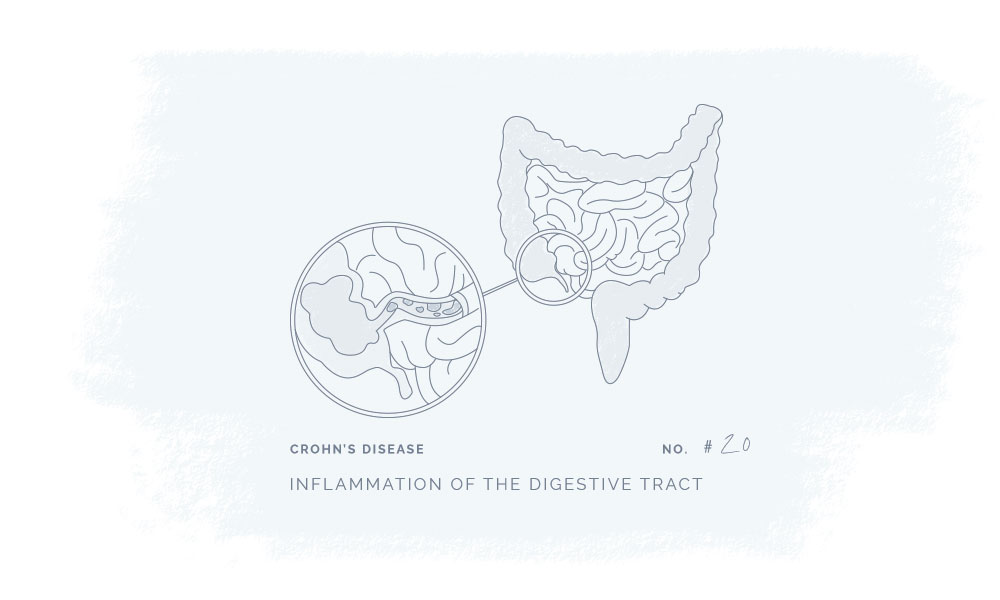Crohn's Disease
Category
Digestive, Inflammatory
REVIEWED BY
Our Biomedical Scientist
Reviewed based on
Literature Discussion & Clinical Trials
Last update
August 2020

What is Crohn's Disease
Crohn’s disease is an inflammatory bowel disease (IBD) that leads to inflammation in different areas of the digestive tract. Crohn’s disease can spread deep into the layers of affected bowel tissues and lead to life-threatening complications if it goes without medical attention.1
Symptoms
Signs and symptoms of Crohn’s disease may vary greatly from individual to individual as they can range from mild to severe. They can develop gradually, but they can also appear immediately. When Crohn’s disease is active, the main symptoms may be:1
- Abdominal pain and cramps
- Fatigue
- Diarrhea
- Fever
- Sores in the mouth
- Blood in stool
- Reduced appetite and unintended weight loss
- Pain or drainage near or around the anus
Cause
Up to this date, the exact cause of Crohn’s disease is not yet known. However, factors that can play a role in the development of Crohn’s disease are:1
- Immune system
Crohn’s disease can be caused by a virus or bacterium. When the immune system of a person fights off the foreign intruders, an abnormal immune response results in the immune system attacking the cells in the digestive tract too.
- Genetics
To have family members with the disease may increase the risk
The connection between Cannabinoids & Crohn's Disease
Studies find that CBD and THC may have great therapeutic potential and may be used to help treat Crohn’s Disease. CBD and THC are well-known cannabinoids, however, they do not have the same psychoactive effects. THC is psychoactive while CBD does not possess psychoactive effects. According to WHO guidelines, the cannabidiol CBD is generally well tolerated with a good safety profile.
Preclinical evidence proposes that the cannabinoids THC, CBD, THCV , and CBG may be therapeutic in the treatment of Crohn’s disease, as cannabinoids may possess anti-inflammatory properties.2
In a recent review article, it has been suggested that symptoms connected to IBD like pain, loss of appetite, and diarrhea can be improved by exogenous cannabis and related cannabinoids.3
The literature discussion is an overview of the published results from scientific studies investigating if and how cannabinoids can be beneficial in the treatment of Chron’s Disease. The overview will be updated regularly to ensure the newest and most accurate information.
CBD, CBG and THCV may exhibit intestinal anti-inflammatory activities
Cannabinoids like THCV, CBD, and CBG were shown to exhibit anti-inflammatory activities in experimental intestinal inflammation.4
Interaction between TRP and cannabinoids
TRP receptors (TRPV1-4, TRPA1, TRPM8) are involved in pain sensation but may also play a role in inflammation. It was shown that there is an interaction between TRPs and cannabinoids (endo and phytocannabinoids) with varying affinities.5,6
This means that TRPs can be excellent targets and plant cannabinoids excellent substrates to manage pain and inflammation.
Clinical trials are research studies that examine new treatments and evaluate their effects on human health outcomes.
Cannabinoids may relieve symptoms similar to Crohn’s disease
In a prospective placebo-controlled study, 45% of patients with Crohn’s Disease achieved complete remission compared to 10% for placebo when smoking cannabis.7
- https://www.mayoclinic.org/diseases-conditions/crohns-disease/symptoms-causes/syc-20353304
- https://ghmedical.com/endocannabinoid-system/diseases/crohns-disease
- Ambrose, T., Simmons, A., (2018). “Cannabis, Cannabinoids, and the Endocannabinoid System—Is there Therapeutic Potential for Inflammatory Bowel Disease?”. https://www.ncbi.nlm.nih.gov/pmc/articles/PMC6441301/
literature - Alhouayek, M., Muccioli, G., (2012). ” The endocannabinoid system in inflammatory bowel diseases: from pathophysiology to therapeutic opportunity. Trends Mol. Med. 18, 615–625”. https://pubmed.ncbi.nlm.nih.gov/22917662/
- De Petrocellis et al., (2011). “Effects of cannabinoids and cannabinoid-enriched Cannabis extracts on TRP channels and endocannabinoid metabolic enzymes. J. Pharmacol. 163, 1479–1494”. https://pubmed.ncbi.nlm.nih.gov/21175579/
- De Petrocellis et al., (2012). ”Cannabinoid actions at TRPV channels: effects on TRPV3 and TRPV4 and their potential relevance to gastrointestinal inflammation. Acta Physiol. Oxf. Engl. 204, 255–266”. https://pubmed.ncbi.nlm.nih.gov/21726418/
Clinical trials - Naftali et al., (2013). ” Cannabis induces a clinical response in patients with Crohn’s disease: a prospective placebo-controlled study. Clin. Gastroenterol. Hepatol. Off. Clin. Pract. J. Am. Gastroenterol. Assoc. 11, 1276–1280.e1”. https://pubmed.ncbi.nlm.nih.gov/23648372/
CANNABINOIDS & RECEPTORS
Below you find the plant cannabinoids, cannabinoid receptors, and endocannabinoids that are associated with the potential therapy.
If you have any further information relevant to the connection between Crohn’s Disease and cannabinoids or find any of the information inaccurate, outdated or incomplete please contact us here.

